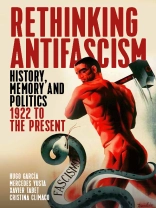Bringing together leading scholars from a range of nations, Rethinking Antifascism provides a fascinating exploration of one of the most vibrant sub-disciplines within recent historiography. Through case studies that exemplify the field’s breadth and sophistication, it examines antifascism in two distinct realms: after surveying the movement’s remarkable diversity across nations and political cultures up to 1945, the volume assesses its postwar political and ideological salience, from its incorporation into Soviet state doctrine to its radical questioning by historians and politicians. Avoiding both heroic narratives and reflexive revisionism, these contributions offer nuanced perspectives on a movement that helped to shape the postwar world.
Table of Content
Acknowledgments
Introduction: Beyond Revisionism: Rethinking Antifascism in the Twenty-First Century
Hugo García, Mercedes Yusta, Xavier Tabet, Cristina Clímaco
PART I: HISTORICAL ANTIFASCISM, 1922-1945: NEW PERSPECTIVES , NEW RESEARCH TOPICS
Chapter 1. Freedom for Thälmann! The Comintern and the Orchestration of the Campaign to Free Ernst Thälmann, 1933-39
Anson Rabinbach
Chapter 2. Was the French Popular Front Antifascist?
Michael Seidman
Chapter 3. ‘Beyond Cable Street’: New Approaches to the Historiography of Antifascism in Britain in the 1930s
Tom Buchanan
Chapter 4. Searching for Antifascism: Historiography, the Crisis of the Liberal State and the Birth of Fascism and Antifascism in Italy, Spain and Portugal
Giulia Albanese
Chapter 5. Was there an Antifascist Culture in Spain during the 1930s?
Hugo García
Chapter 6. Portugal within the European Antifascist Movement, 1922-39
Cristina Clímaco
Chapter 7. The Argentine Antifascist Movement and the Building of a Tempting Domestic Appeal, 1922-46
Andrés Bisso
Chapter 8. Women and Antifascism: Historiographical and Methodological Approaches
Isabelle Richet
Chapter 9. The Strained Courtship between Antifascism and Feminism: from the Women’s World Committee (1934) to the Women’s International Democratic Federation (1945)
Mercedes Yusta
PART II: POLITICAL USES, MEMORY WARS AND REVISIONISM FROM 1945 TO THE PRESENT
Chapter 10. From Antifascistas to PAF: Lexical and Political Interpretations of American International Brigaders in Spain and World War II
Robert S. Coale
Chapter 11. An Antifascist Political Identity? On the Cult of Antifascism in the Soviet Union and post-Socialist Russia
José María Faraldo
Chapter 12. The Burden of the Rear-view Mirror: Myth and Historiography of Republican Antifascism in France
Gilles Vergnon
Chapter 13. Did Revisionism Win? Italy between Loss of Historical Consciousness and Nostalgia for the Past
Stéphanie Prezioso
Chapter 14. Antifascism and the Resistance: Public Debates and Politics of Memory in Italy from the 1990s to Today
Filippo Focardi
Chapter 15. In Search of the Lost Narrative: Antifascism and Democracy in Present Day Spain
Javier Muñoz Soro
Chapter 16. Dictatorship and Revolution: Disputes over Collective Memory in Post-Authoritarian Portugal.
Manuel Loff and Luciana Soutelo
Chapter 17. Antifascism between Collective Memory and Historical Revisions
Enzo Traverso
Bibliography
Index
About the author
Cristina Clímaco is Associate Professor of Portuguese Modern History at the Université Paris VIII. Her research focuses on the opposition to the Estado Novo, specifically Portuguese political exiles of the 1930s. She has published numerous articles and the forthcoming book Republicanos, Anarquistas e Comunistas no exilio, 1927-1936.












